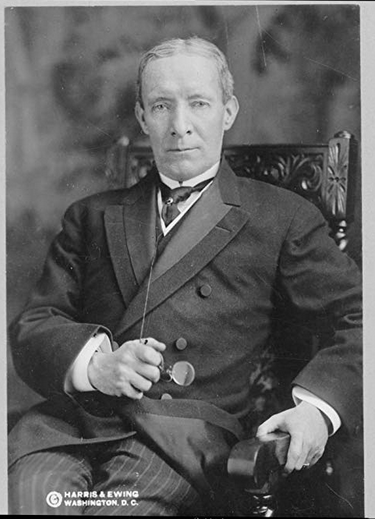John Temple Graves, November 9, 1856 (Willington, SC) – August 8, 1925 (Washington, DC)
VP candidate for Independence Party (aka Independence League aka National Independence League) (1908)
Running mate with nominee: Thomas L. Hisgen (1858-1925)
Popular vote: 82,574 (0.55%)
Electoral vote: 0/483
The campaign:
The Independence Party grew out of William Randolph Hearst's 1904 Municipal Ownership League, created as a springboard for his 1905 run and razor-thin loss for the office of Mayor of New York. Some historians believe the Independence Party, created in 1906, was Hearst's way of punishing William Jennings Bryan (the Democratic nominee in 1908). Hearst apparently felt Bryan had worked against his own quest for the Democratic nomination in 1904. Although not a candidate himself in 1908, the party is an early example of a millionaire single-handedly orchestrating the actions of a third party.
The vice-presidential candidate John Temple Graves, one of Hearst's writers, was quite possibly one of the most vocal avowed racists of his era (which is saying a lot). He advocated lynching, segregation, and the Ku Klux Klan in speeches and articles.
The Independence Party platform included: support for initiative and referendum, 8-hour day, prohibition of convict and child labor, creation of a Dept. of Labor, statehood for Arizona and New Mexico, "exclusion of Asiatic cheap labor," direct election of US Senators, and a graduated income tax.
They were on the ballot in all but six states placing a distant 5th place nationally. Their best showing was in Massachusetts (4.21%) the home state of their presidential candidate. They had an especially miserable showing in Graves' home state of Georgia (0.06%) probably due to the fact it was also home to Populist Party presidential nominee Thomas Watson (who won 12.59% of the Peach State's vote) and who was another vocal avowed racist of his era.
The Independence Party feebly struggled on until 1914, with many of the members eventually returning to the Democratic Party.
Election history:
1886 - Democratic nomination for US House of Representatives (Fla.) - defeated
1905 or 1906 - US Senate (Ga.) (Democratic) - defeated or withdrew
1908 - Independence Party nomination for US President - defeated
Other occupations: Democratic Party presidential elector 1884 (Fla.) - 1888 (Ga.), teacher, newspaper editor, orator
Buried: Westview Cemetery (Atlanta, Ga.)
Notes:
Great-grandnephew of John C. Calhoun.
Rejoined the Democratic Party in 1912.
Wrote race-baiting incendiary articles in his newspaper and some historians place responsibility on
him for creating an atmosphere that led to the Atlanta riots of 1906.
Was an early supporter of the Stone Mountain Confederate carving.
"Let the Government set aside, out of its vast public domains, a large territory for a sovereign State to
be officered and controlled exclusively by the negroes and no whites to have the right to vote therein,
the Government to maintain troops to preserve order. The only price the negro need pay for this
privilege would be his right to vote in any other State."--John Temple Graves paraphrased by the
Washington Post, Aug. 13, 1893.
Graduate of the University of Georgia 1875.
Campaigned for Cleveland in 1892.
Sometimes called "Colonel Graves" although he apparently was never in the military, probably it was
an honorary title bestowed by the Governor of Georgia.
In a 1907 speech urged Democrats to support Theodore Roosevelt.
"The people of the South will not be scared by threats of the federal court, and if it invades the state's
authority and takes charge of these cases there is the Kuklux Klan to fall back on, which was the
most effective agency that the Southern country had ever known against crime and lawlessness."--
John Temple Graves 1904.






